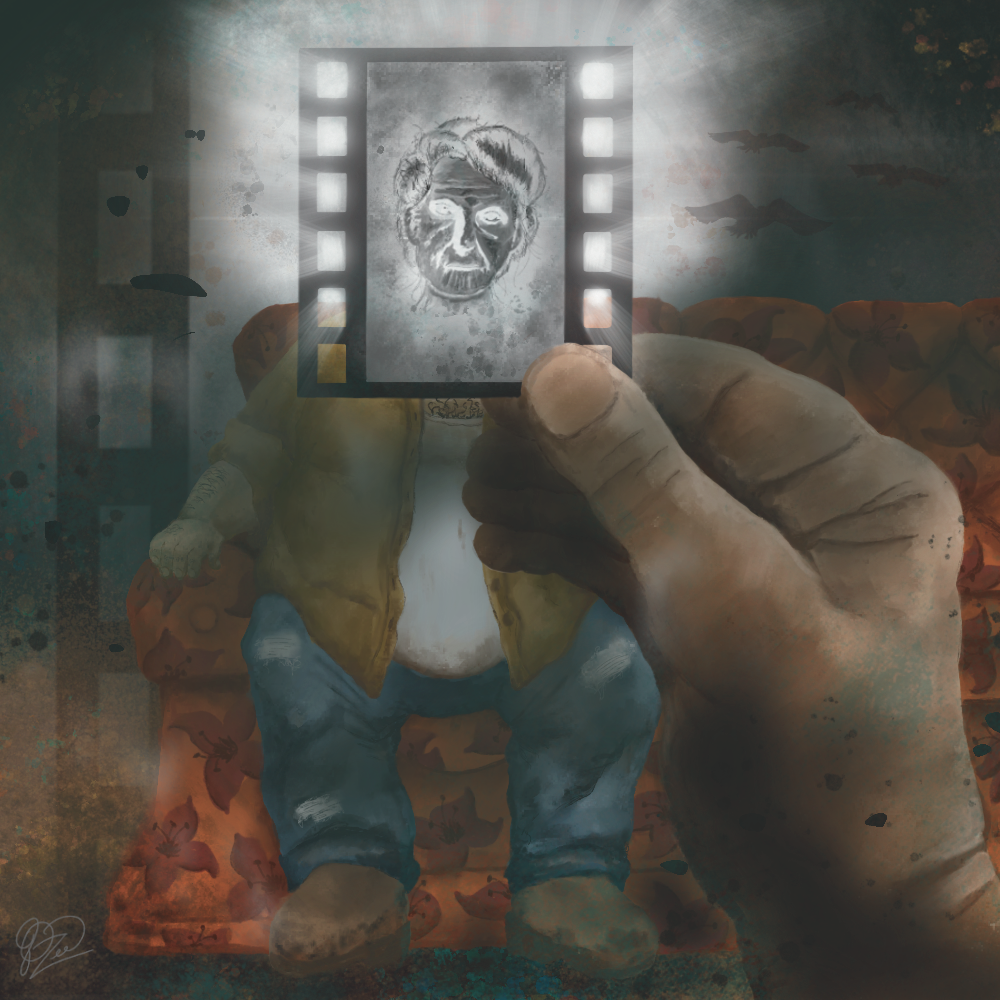You’re Just Gonna Have to Wait

art by Jennifer DiDonato
A vulture croaked, leapt from the ground, and took to the tree above, making a flock of little birds flee its massive wings. Streaks of feathers sliced through the browning needles. Marlo clicked open the padlock, let the chain drop. The gate groaned open as he heaved the rusty wheels along the bent and pitted track. Marlo waggled a gnarled finger up at the bird he could hear still situating itself in the pine.
“You’re just gonna have to wait,” he said.
Marlo hoisted himself back up in the truck and ran his eyes over Tank in the passenger seat. The man hadn’t said much since Marlo had baited him in with the promised sale of an impressive collection of 1930s film memorabilia. The tires twisted and gravel popped as Marlo pulled the truck out of the narrow alleyway and into the corrugated metal garage.
After Marlo closed the gate, he plodded up the steps to the drab brick house, Tank behind him like an oversized shadow. Marlo opened the door and told the man to go and have a sit-down, waving a hand toward the orange floral couch that had been in the same four carpet indentations since 1975. Tank sat, nearly filling the couch. Marlo went to the kitchen and took his time collecting glasses, ice, and sweet tea. As Marlo moseyed his way into the living room, a flash of annoyance crossed Tank, making it look as if he flickered. “Don’t need the formalities. Just show me what it is you’ve got to sell.”
“Patience, now. I recall you promising to hear where the collection came from. I don’t get out much these days… You wouldn’t deny an old man his stories to tell, would you?”
Tank muttered something Marlo couldn’t hear.
Marlo set down a glass, already sweating condensation, in front of Tank on the nicked and faded coffee table and then sank into his chair. Mostly aiming his words at the worn carpet, Marlo began.
“What I’ve got is like a family heirloom, passed down, more precious than valuable, but it came with a hefty cost—and I’ll have to ask for a similar price.”
Marlo glanced up.
“Sure, you name it. We’ll work something out.”
Marlo returned his gaze to the carpet.
“In 1927, my grandad got to see the very first talkie. It left him smitten with dreams of moving the family to Hollywood. I guess he drove my grandma crazy going on and on, his face all lit up while talking about making movies and hobnobbing behind the silver screen. Grandad never did get his dream, but Dad told me a dozen stories about how he tried. Dad wasn’t the movie lover his father was, but he liked stories and legends.” Marlo gripped his thighs a little tighter. “There was one particular local legend. A figure who became famous both inside and outside the movie theaters around these parts.”
Tank sat unmoving, sweet tea untouched. Marlo went on:
“In 1931, she was 70 years old and barely five feet tall. They left her penniless when they put her out from her job at the laundry service. Age was slowing her down and they’d waited long enough, they said. With nowhere else to go, she haunted the halls of her rooming house, finding tasks for pay—mending, cooking, and cleaning. But she knew people only gave her the work out of pity. She had never married and had no living family. Those she would have called friends had rearranged the letters of Mavis Rogsdale to spell Old Miss Ravage on the laundry staff directory board and then called her the awful nickname until the day she was sacked. As she sat darning a neighbor’s socks one day, she realized she had no reason—and frankly—no wish to go on like this.
“A lot of people believed that’s how she died too, curled up somewhere and dissolved into dust. No one put two and two together when little Alma Drovigess became a recognizable figure in the neighborhood. The young girl wore long dark pigtails under sun hats, long gloves, patterned stockings, and most notably, intricate handmade masks—wooden, wicker, or molded tin, felt or wool in the winter. She rarely spoke, but when she did it was in a cherry chipper voice. She said nothing more about her condition besides that, calling it a condition, which frightened people away from asking her to lift the mask.
“After the mayor declared that talkies were a glimpse into the world of the future, theaters in the city started giving free tickets to children. Alma took a keen liking to Dracula and more so to the newest monster movie, Frankenstein, but she would see whatever was showing a few times per week. The police never figured out what she was up to—my daddy did though. Little Alma would slip in with the cinema crowd, slip out for a while, and come back to collect her sun hat before the projectionist changed reels.
“Old Miss Ravage had been a good listener at the laundry service and had picked up on where she could find gambling dens and cock fights. Her ruse was the same every time. She’d slip in as Alma, find a rich-looking man who was off on his own, and cry in her child’s voice that she was terribly lost and scared; what a horrible place this was! When the man would inevitably lead her back out to the alley, she’d give him the option of handing over everything he had on him or eating a bullet from her Smith & Wesson revolver. She knew the men wouldn’t risk going to the police. And most of them were too humiliated by getting robbed by who they thought was a child to spread news of her. Those who took one step toward her before emptying their pockets ended up dead.”
Marlo looked at Tank to see how it all landed. The man flickered like film leader whipping through the projector at the end of the reel.
“Legend has it,” said Marlo, “that you tried to pull the same kind of deception on the devil when your time was up, but he found you out and punished you by closing his gate. Left you to forever wander the city that scorned you. Still, you try and try to trick your way out of your purgatory, wrangling other spirits, taking their form. And that is what Tank is to you, isn’t he? Just another mask.”
Tank held Marlo’s gaze for a long minute. In a puff of smoke and what could have been lace, Tank’s massive form on the couch was replaced by Old Miss Ravage.
“There’s one thing good about being long gone,” said Old Miss Ravage. Her voice creaked like a wooden house at night. “I don’t need my revolver anymore.”
In a flash, she leapt at Marlo but appeared back on the couch as if she never left. Her eyes cast around wildly. Marlo likewise didn’t move from his chair, although he could.
“Dad was just a baby when you shot my grandfather dead and killed his Hollywood dreams,” said Marlo. “Dad spent his entire life trying to track down the murderer, slowly piecing together the story, learning all your clever little names. He learned black magic too when he figured out he’d have to trap a ghost. Dad’s gone now, but when I was young, we did some carving on the underside of that couch and in the floorboards for good measure.”
Marlo reached down and patted the dirty brown shag.
“You can’t kill me. I’m already dead,” said Old Miss Ravage. She tried to struggle out of the spell again. “If you want me gone, you’re just gonna have to wait. Or else leave me here until this old thing turns to dust. How many years will that take? You’ll die eventually. But me? I’ve got nothing but time.”
“You got some of that right. You’ll get to keep the couch and you get to be gone, but not in the way you’re after. A few of my buddies are on their way. We’re going to take you somewhere more fitting for—I don’t care if you look like a little old lady or not—you’re a murderer and a thief.”
Marlo stood, towered above her without getting too close.
“Your father told you I chose those men at random, didn’t he? Shot anyone who made a wrong move? You got some of my story right too, but you paint me like a highway robber, jumping out from the bushes and snatching what I could—but that’s not the real story. I made every single one of those men give me exactly what they owed and not a penny more. They’d all taken advantage—in so many ways over so many years. The ones who took more advantage were the ones who got shot. But look at you now. Just as thirsty for revenge as I was. You think you’re not on the devil’s list too?” Her face peeled into a grin.
Marlo leaned in, daring her to get him now. “At least I’m not a worthless old hag who has to dress up like somebody else and kill people before I get to matter.”
Old Miss Ravage seemed to find the insult amusing. “At least I never murdered an innocent man because I thought he killed my granddaddy.”
The words hit like a punch. How could she know that? Marlo took a step back, knocking into the coffee table, and making the glass of sweet tea wobble and fall to the floor, soaking the carpet and seeping under the couch.
A silence stretched between them. Marlo was stony-faced; Old Miss Ravage sat grinning. Finally, Marlo broke the gaze and bent to pick up the fallen glass. He studied the wet spot; at least nobody would notice the stain. Marlo reached over and set the empty glass on the far couch cushion before tugging the coffee table toward the TV to clear a path to the door.
He went to the window and peered out for several minutes, waiting for the sound of crunching tires or the sight of the U-Haul.
With his back turned, Marlo didn’t see the glass roll down the cushion and land against Old Miss Ravage’s gingham dress. If she broke the glass, she did it silently. Marlo had no idea what was coming when he went to move the lamp away from the couch and got too close.
Marlo fell back, landed seated on the floor, clutching his gut. Blood began pouring between his fingers.
Old Miss Ravage stood. Her tiny form towered over Marlo now. She plucked his cell phone from his shirt pocket, snapped it in half, and dropped the pieces.
In the living room doorway, she turned. “How disappointing,” she said. “I never got to see the film memorabilia.”
She asked Marlo if the collection was real or all part of his ploy. When he refused to answer, she shook her head. “It’s probably best if I leave now, but maybe your buddies will get here in time. It can take a while to bleed out from the belly.”
“You won’t get far; it’s not like you can leave town. I found you once. I’ll do it again,” said Marlo, but his shaking voice betrayed him. He couldn’t figure out how she broke the spell. Had time worn away some of the carvings from the wooden boards? Had Dad gotten the symbols wrong? Was she pretending to be trapped the whole time, pulling another ruse? Or did she know something he didn’t?
Old Miss Ravage would never tell.
She toddled down the front steps, crossed the yard, and walked through the gate out into the alley. From atop a lamp post, a black vulture eyed her as she went.


